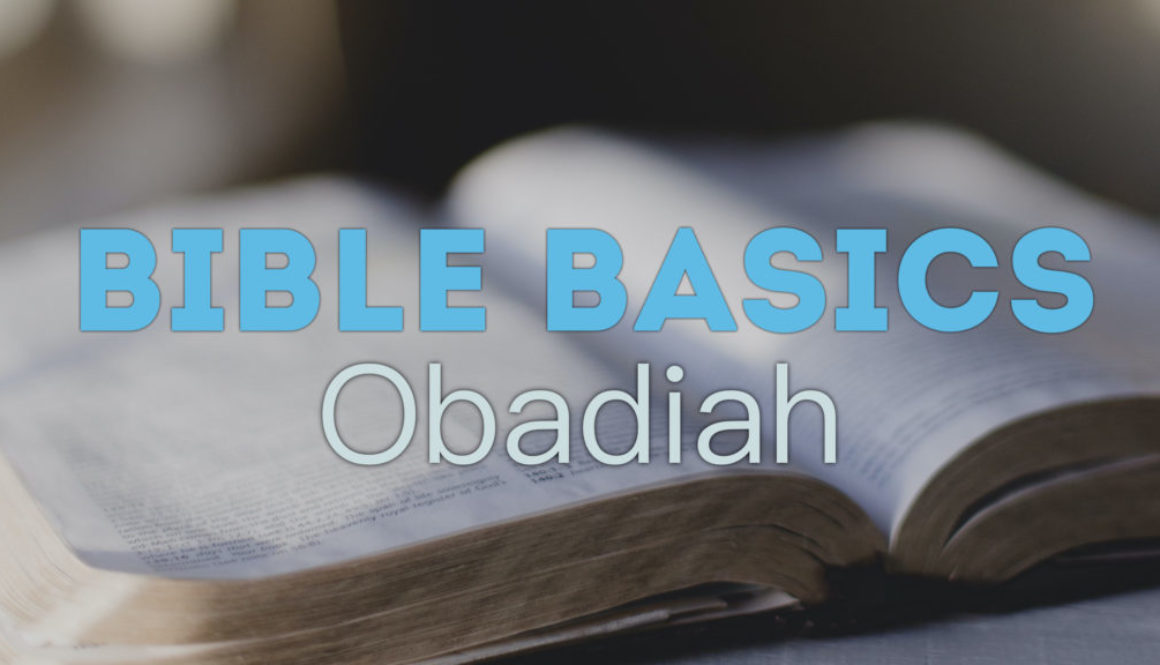Obadiah
Author
Obadiah, whose name means either “servant of Yahweh” or “worshipper of Yahweh.” Although there are more than a dozen others named “Obadiah” in the Old Testament, there is not enough evidence to connect the author of this minor prophet to any of them with certainty.
Date
It is difficult to determine the exact date of the writing, as the book itself does not give any specific indicators, such as the rule of a king. This may be because there was not a king sitting on the throne at the time, which leads many scholars to believe the book was likely written in the mid 580’s B.C; after the Babylonian conquest of Jerusalem around 586 B.C., but before the Babylonian conquest of Edom in 583 B.C.
This date would make Obadiah a contemporary of Jeremiah. This may be why Jeremiah seems to quote Obadiah on a few occasions: Obadiah 2:5 in Jeremiah 49:9; Obadiah 2:6 in Jeremiah 49:10; and Obadiah 2:8 in Jeremiah 49:7.
A second possible date for the writing would be during the invasion of Jerusalem by the Philistines and Arabians during the reign of King Jehoram, sometime between 840 and 825 B.C; although I believe this is less likely.
Audience and Purpose
Obadiah was prophesying agains the Edomites — the descendants of Esau — who had stood against Judah during the Babylonian invasion. Many Edomites even captured and turned in escaping Israelites to Babylonian authorities. As with other prophets, Obadiah closes with the promise of restoration for God’s people. Obadiah is the shortest book in the Old Testament.
Despite his message being proclaimed against Edom, it is likely that Obadiah only presented this prophecy to the Jewish remnant in Jerusalem, rather than being delivered to the Edomites themselves. This was a common practice among Old Testament prophets.
Major Themes
- God’s Sovereignty
- Sin and Judgement
- God’s Promise of Salvation and Restoration.
- The Day of the Lord.
Key Scriptures
- Obadiah 1:21 — “Saviors shall go up to Mount Zion to rule Mount Esau, and the kingdom shall be the Lord’s.”
Outline
- Obadiah 1:1-9 — Prophecy of God’s Judgment against Edom
- Obadiah 1:101-14 — List of Edom’s Sins
- Obadiah 1:15-21 — The Day of the Lord
Gospel Summary
Obadiah is so short, and his message so pointed, that it is likely easier to simply read it than to summarize. The book draws a drastic distinction between how God cares for His own people, and those outside of His covenant care. When the nations bless God’s people, they are blessed. However, when the nations become the enemies of God’s people, God Himself will avenge them.
The theme of God’s sovereignty over the nations is evident, even as the book closes with a look to the future when God’s people will be fully restored and God’s kingdom will rule in the earth. The pridefulness and self-confidence of the nations will be brought down (see v. 3, which is likely a reference to the ancient city of Petra, which was within Edom’s borders). This promise of restoration points, again, to God’s coming Messiah and King, Jesus.
If you’re enjoying the content I produce, a little caffeine to keep me going would be appreciated!
© Anthony Scott Ingram 2021. All Rights Reserved.
Photo by Carolyn V on Unsplash
Unless otherwise indicated, all Scripture quotations are from The Holy Bible, English Standard Version®, copyright © 2001 by Crossway Bibles, a publishing ministry of Good News Publishers. Used by permission. All rights reserved.”
Please note that I do get a small kickback from Amazon for any purchases made using the links on this post. Should you choose to purchase from them, I just want to say thank you for further supporting my work in ministry!
